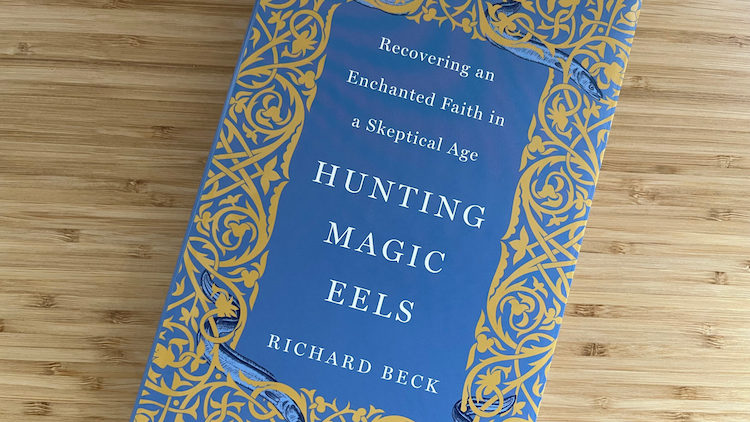Hunting Magic Eels
I recently finished reading Richard Beck’s latest book, Hunting Magic Eels. It was a fantastic read and a book I’d recommend to anyone. The subtitle explains his premise well: “Recovering an Enchanted Faith in a Skeptical Age.”
I was initially drawn to this book as this topic seems to be an underlying premise of so many of our conversations on the Forest and Trees podcast (see: podcast page). In addition, I still think about things Beck wrote in his book Unclean many years after I read that one. Beck writes deeply about the Christian experience from the perspective of psychology (he’s a professor).
One of the themes throughout the book is that we need to be mindful of what gets our attention. And if we want to experience more of God, we need to find ways to aim our attention in that direction.
Faith is a matter of perception. Faith isn’t forcing yourself to believe in unbelievable things; faith is overcoming attentional blindness. Phrased differently, faith is about enchantment or, rather, a re-enchantment: the intentional recovery of a holy capacity to see and experience God in the world.
After his flight from Egypt, Moses is tending his father-in-law’s sheep in the middle of the desert near Mount Horeb. There, in the middle of nowhere, he catches sight of a bush that’s caught fire. Strangely, the bush isn’t being burnt up. Intrigued and fascinated, Moses says, “I must turn aside and see this strange sight.” I must turn aside. This is the key point. Encountering God’s presence requires a shift of attention. Moses must intentionally direct his attention to behold the strange sight.
When faith is a matter of attention, we need visual cues to capture and captivate our hearts and minds.
One of the most profound ideas in the book is how we’ve reduced Christianity to something that has inherently moved us away from experiencing God. Beck says it this way:
When the Christian experience shifts away from the mystical toward “being a good person,” the foundation of faith is relocated and placed in a very vulnerable location, like a cup set dangerously close to the edge of the table or a rock pushed to the edge of a cliff. Why? Because you don’t have to believe in God to be a good person. There are many people who don’t believe in God who are amazing, generous, and loving people. And once you make that observation, that you don’t need God to be good, the whole reason many of us have for believing in God simply evaporates. The glass falls off the table and shatters, and the rock tips over into the abyss.
He also does a great job—as a skeptic himself—showing how we need to challenge our own skepticism.
We still believe in the soul, even in this skeptical age. And we’d be horrified if anyone claimed otherwise. More and more people might doubt the existence of God, but God still haunts us. We crave the magic. We resist reducing our lives to biology. We are convinced that we are “more” than the sum total of our organs, bones, and tissues.
As Dostoevsky once said, “Beauty will save the world.” Music, art, poetry, and architecture, along with the wonders of the natural world, are much better equipped to capture and communicate the ineffable nature of spiritual insights and truths.
If you’re struggling with disenchantment, odds are you’re thinking rather than paying attention.
And in case you fear this is some progressive mumbo-jumbo, the book also explores how to seek out an enchantment that is able to challenge you to grow and get better rather than just reassure you that all your opinions and actions are perfect.
The critical issue, then, for both the religious and the spiritual alike, is this: Can your enchantment judge, criticize, and unsettle you? Can your enchantment point out your selfishness and self-indulgence? Can your enchantment, be it burning sage for your spell or singing “God Bless America” in your pew, hold a mirror up to your hypocrisy? Can your enchantment weigh your nation or political party on the scales and find it wanting? Does your enchantment create sacrificial obligations and duties in your life that you cannot avoid or ignore? Does your enchantment call you to extend grace to people you’d prefer to hate? Does your enchantment bust up your cozy self-satisfaction and dogmatic self-righteousness? These are questions that won’t be asked by an enchantment bought on Amazon. This fierce and honest moral examination can only be conducted by an enchantment that is “over and above” us, an enchantment that can judge us and hold our feet to the fire, an enchantment that cannot be avoided or blown off like the latest fad. These are the questions we have to ask when we seek to “discern the spirits,” when we want to determine if the voice we are hearing is from God or from our own egos.
This is a book that gave me lots to chew on while also nudging me closer to experiencing Jesus in new ways. What a gift to find both in one book.
CLICK HERE to get your own copy.
(Disclaimer: As a Faithlife Partner, I may earn commissions from qualifying purchases from Logos.com at no cost to you. Your reading can help support my writing. Thank you!)
Faith is a matter of perception. Faith isn’t forcing yourself to believe in unbelievable things; faith is overcoming attentional blindness. Click To Tweet
Do You Want to Read the Bible Without Falling Behind?
Sign up your email and I’ll send you a PDF to download and use my custom-made reading plan system. There’s no way to fall behind on this system and every day will be different no matter how long you use it!
I’ll send future content directly to your inbox AND you can dive into the Bible like never before.





